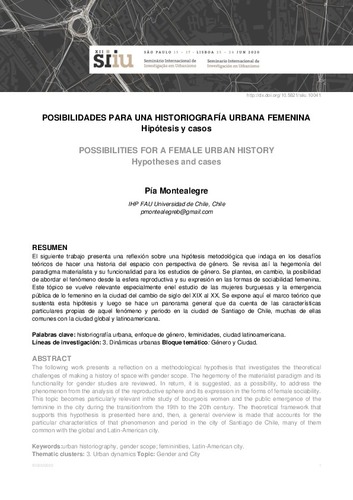Posibilidades para una historiografía urbana femenina: hipótesis y casos

Visualitza/Obre
Cita com:
hdl:2117/336626
Tipus de documentText en actes de congrés
Data publicació2020-06
EditorFaculdade de Arquitetura da Universidade de Lisboa
Universidade Presbiteriana Mackenzie de São Paulo
Pontifícia Universidade Católica de Campinas
Grup de Recerca en Urbanisme de la Universitat Politècnica de Catalunya
Academia de Escolas de Arquitectura e Urbanismo de Língua Portugues
Universidade Presbiteriana Mackenzie de São Paulo
Pontifícia Universidade Católica de Campinas
Grup de Recerca en Urbanisme de la Universitat Politècnica de Catalunya
Academia de Escolas de Arquitectura e Urbanismo de Língua Portugues
Condicions d'accésAccés obert
Llevat que s'hi indiqui el contrari, els
continguts d'aquesta obra estan subjectes a la llicència de Creative Commons
:
Reconeixement-NoComercial-SenseObraDerivada 4.0 Internacional
Abstract
El siguiente trabajo presenta una reflexión sobre una hipótesis metodológica que indaga en los desafíos teóricos de hacer una historia del espacio con perspectiva de género. Se revisa así la hegemonía del paradigma materialista y su funcionalidad para los estudios de género. Se plantea, en cambio, la posibilidad de abordar el fenómeno desde la esfera reproductiva y su expresión en las formas de sociabilidad femenina. Este tópico se vuelve relevante especialmente enel estudio de las mujeres burguesas y la emergencia pública de lo femenino en la ciudad del cambio de siglo del XIX al XX. Se expone aquí el marco teórico que sustenta esta hipótesis y luego se hace un panorama general que da cuenta de las características particulares propias de aquel fenómeno y periodo en la ciudad de Santiago de Chile, muchas de ellas comunes con la ciudad global y latinoamericana. The following work presents a reflection on a methodological hypothesis that investigates the theoretical challenges of making a history of space with gender scope. The hegemony of the materialist paradigm and its functionality for gender studies are reviewed. In return, it is suggested, as a possibility, to address the phenomenon from the analysis of the reproductive sphere and its expression in the forms of female sociability. This topic becomes particularly relevant inthe study of bourgeois women and the public emergence of the feminine in the city during the transitionfrom the 19th to the 20th century. The theoretical framework that supports this hypothesis is presented here and, then, a general overview is made that accounts for the particular characteristics of that phenomenon and period in the city of Santiago de Chile, many of them common with the global and Latin-American city.
CitacióMontealegre, P. Posibilidades para una historiografía urbana femenina: hipótesis y casos. A: Seminario Internacional de Investigación en Urbanismo. "XII Seminario Internacional de Investigación en Urbanismo, São Paulo-Lisboa, 2020". São Paulo: Faculdade de Arquitetura da Universidade de Lisboa, 2020, DOI 10.5821/siiu.10041.
ISSN2604-7756
| Fitxers | Descripció | Mida | Format | Visualitza |
|---|---|---|---|---|
| 10041-11262-1-SM.pdf | 1,114Mb | Visualitza/Obre |


